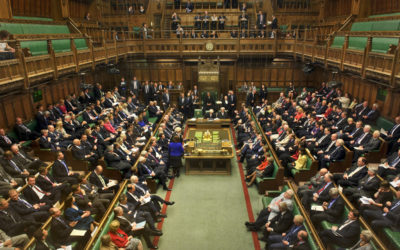UK military R&D is aggressive and counter-productive
The Guardian
Why is the UK government focusing R&D spending on offensive weapons in preference to tackling the roots of conflict?
Why is the UK government focusing R&D spending on offensive weapons in preference to tackling the roots of conflict?
UK public spending on military research and development has long been among the highest in the world. Its advocates argue that this spending is focused on defending Britain and keeping our soldiers safe – an argument that has been hard to challenge because of the opaque nature of Ministry of Defence accounting practices.
However, thanks to data obtained using freedom of information requests and published in a new report by Scientists for Global Responsibility (SGR), it is now possible to see just how misleading this argument is. What’s more, examination of R&D spending on tackling the roots of conflict shows that this is much less than the military spend.
SGR used the three-year period 2008-11 as the basis for its analysis. In total, the MoD’s R&D spending during this period was about £5.3bn. We were able to obtain project level spending data for about three-quarters of this spending. We found that the bulk was spent on developing major weapons systems, including combat aircraft, submarines and nuclear weapons. Using the military academic literature, we classified all the spending according to whether the systems had a major “offensive” capability – aimed at “projecting force” far from British shores – or not. We estimated that 76% of the spending was for offensive systems.
The top R&D spending area was strike planes, ie jets whose main roles include carrying out long-range bombing raids. The two principal planes in this area are the Typhoon (also known as the Eurofighter) and the Joint Combat Aircraft (Joint Strike Fighter or F-35 Lightning II). R&D spending in this area was reported to be £771m over the three-year period. The Typhoon was originally developed during the cold war for fighting Soviet jets but, since then, further development work has adapted them to carry out long-range ground strikes. The UK plans to use the F-35s on its new aircraft carriers, also to “project force” at long-range.
The weapons with the strongest offensive capability are, unsurprisingly, nuclear weapons. Britain’s current Trident system comprises four submarines, each with the capability of launching nuclear warheads against up to 40 city targets, killing millions. R&D in this area relates to both the current system and the new system. The latter is still in the early stages of development, and has yet to get the final approval from parliament, but it is clear that a similarly destructive capability is envisaged for the future. R&D spending in this area between 2008 and 2011 includes £317m on the nuclear weapons themselves, and a large fraction of the £674m spent on R&D for all submarines (both nuclear- and conventionally-armed) and their propulsion systems.
A rapidly growing and equally controversial area of the MoD’s R&D spending is drones – both for surveillance and armed roles. Funding in this area was £195m between 2008 and 2011, and seems set to rise. Some of the funding has been for the development of two armed systems made by BAE Systems, the Mantis and Taranis. The Mantis is similar to the Reaper, the US-manufactured drone already deployed by UK forces in Afghanistan and Libya. The Taranis is more advanced, utilising stealth technology and capable of supersonic speeds.
In contrast to the military spending, the SGR report looked at civilian R&D that contributes to understanding and tackling the roots of conflict. To estimate this spending, we used a concept known as “sustainable security” developed by the think-tank, Oxford Research Group. The thinking behind this concept is that, in order to create stable, long-term security, it’s necessary to deal with the root causes of conflict, rather than respond to the symptoms through the (often ineffective or counter-productive) use of military force.
There are four key drivers of insecurity that are growing rapidly in importance: competition over resources, including water, food, land, oil and other minerals; global climate change, whose threat has starkly been re-emphasised in the new report from the Intergovernmental Panel on Climate Change; marginalisation through unfair political, economic and social systems; and global militarisation, the build-up of weapons through the international arms trade.
In estimating the public spending on R&D to understand and tackle these problems, our report includes a wide range of areas, including international development and poverty alleviation, climate change impacts, sustainable energy technologies, food security, international relations, natural resources management and environmental hazards.
We first looked at direct government R&D spending in these areas, and estimated this was only equivalent to about 14% of the annual military R&D spend. We then included all public R&D spending, including that funded by the (largely autonomous) research councils. This increased the figure to 54%. While this is a more respectable level, it is based on a very wide range of R&D, most of which does not have a direct link with policymakers in the security arena.
So, on the one hand, the UK has a high level of military R&D mainly geared towards developing offensive weapons systems at a time when the government acknowledges that the nation faces no conventional military threats, and with its recent history of military intervention in Iraq and Afghanistan being highly counter-productive. On the other hand, we have major drivers of insecurity across the world, on which we fund high-quality R&D, but it is at much lower levels than in the military sphere and has limited links to policymaking on security.
It’s time for a shift in R&D spending – from developing offensive weapons to understanding and tackling the roots of conflict. Using this R&D more widely in policymaking, in economic development and in developing cleaner technologies would galvanise deeper, positive change in the UK’s approach to insecurity. We need to push the government to pursue this option. There would be economic, social and environmental benefits – and it would provide a path towards genuine security.
Dr Stuart Parkinson is Executive Director of UK campaign group, Scientists for Global Responsibility
See more: legislation & policy,








